Saturday, October 13th 2018

New PT Data: i9-9900K is 66% Pricier While Being Just 12% Faster than 2700X at Gaming
Principled Technologies (PT), which Intel paid to obtain some very outrageous test results for its Core i9-9900K eight-core processor launch event test-results, revised its benchmark data by improving its testing methodology partially. Initial tests by the outfit comparing Core i9-9900K to the Ryzen 7 2700X and Ryzen Threadripper 2950X and 2990WX, sprung up false and misleading results because PT tested the AMD chip with half its cores effectively disabled, and crippled its memory controller with an extremely sub-optimal memory configuration (4-module + dual-rank clocked high, leaving the motherboard to significantly loosen up timings).
The original testing provided us with such gems as the i9-9900K "being up to 50 percent faster than 2700X at gaming." As part of its revised testing, while Principled Technologies corrected half its rookie-mistakes, by running the 2700X in the default "Creator Mode" that enables all 8 cores; it didn't correct the sub-optimal memory. Despite this, the data shows gaming performance percentage-differences between the i9-9900K and the 2700X narrow down to single-digit or around 12.39 percent on average, seldom crossing 20 percent. This is a significant departure from the earlier testing, which skewed the average on the basis of >40% differences in some games, due to half the cores being effectively disabled on the 2700X. The bottom-line of PT's new data is this: the Core i9-9900K is roughly 12 percent faster than the Ryzen 7 2700X at gaming, while being a whopping 66% pricier ($319 vs. $530 average online prices).This whopping 12.3% gap between the i9-9900K and 2700X could narrow further to single-digit percentages if the 2700X is tested with an optimal memory configuration, such as single-rank 2-module dual-channel, with memory timings of around 14-14-14-34, even if the memory clock remains at DDR4-2933 MHz.
Intel responded to these "triumphant" new numbers with the following statement:
The entire testing data follows:
Source:
Principled Technologies (PDF)
The original testing provided us with such gems as the i9-9900K "being up to 50 percent faster than 2700X at gaming." As part of its revised testing, while Principled Technologies corrected half its rookie-mistakes, by running the 2700X in the default "Creator Mode" that enables all 8 cores; it didn't correct the sub-optimal memory. Despite this, the data shows gaming performance percentage-differences between the i9-9900K and the 2700X narrow down to single-digit or around 12.39 percent on average, seldom crossing 20 percent. This is a significant departure from the earlier testing, which skewed the average on the basis of >40% differences in some games, due to half the cores being effectively disabled on the 2700X. The bottom-line of PT's new data is this: the Core i9-9900K is roughly 12 percent faster than the Ryzen 7 2700X at gaming, while being a whopping 66% pricier ($319 vs. $530 average online prices).This whopping 12.3% gap between the i9-9900K and 2700X could narrow further to single-digit percentages if the 2700X is tested with an optimal memory configuration, such as single-rank 2-module dual-channel, with memory timings of around 14-14-14-34, even if the memory clock remains at DDR4-2933 MHz.
Intel responded to these "triumphant" new numbers with the following statement:
Given the feedback from the tech community, we are pleased that Principled Technologies ran additional tests. They've now published these results along with even more detail on the configurations used and the rationale. The results continue to show that the 9th Gen Intel Core i9-9900K is the world's best gaming processor. We are thankful to Principled Technologies' time and transparency throughout the process. We always appreciate feedback from the tech community and are looking forward to comprehensive third party reviews coming out on October 19.The media never disputed the possibility of i9-9900K being faster than the 2700X. It did, however, call out the bovine defecation peddled as "performance advantage data."
The entire testing data follows:




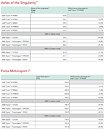
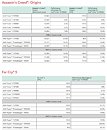
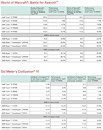



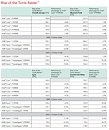
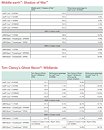

322 Comments on New PT Data: i9-9900K is 66% Pricier While Being Just 12% Faster than 2700X at Gaming
oh well confirmed either next Ryzen gen or a 2700X, the 9900K is not worth it, and i doubt the 9600/9700 will do better ... in term of price and well 12% faster is a joke
perf report oh well as long as the 2700X isn't under 60fps it's all right (ashes of singularity? crazy? mah that one is a joke too ... and 55 to 35 is not that horrible ) and it isn't in any of the game i play
no stomping no overwhelming domination (7 month later ... ) except in price (for overwhelming domination) and "look at our benchmark we are better" (for stomping their feet on the ground)
You sound like someone who'd be fine with Intel overcharging for small or some times non existent upgrades. Do you realize how the consumer market is aiding & abetting this greedy company, or Nvidia ~ like the Dells, HPs did in the past ~ even if unwittingly?
Gaming on (ry)Zen
Gaming on Intel
Just a tiny part of the market replaces CPUs every generation. This means if you buy into an either system today, you'll most likely have to replace the mobo next time.5-10% is the performance increase we get every year (not including occasional core count increase). In other words, 9900K is a year or more before the competition. Not bad, right?There's a good reason why low-res tests are important. Read about it.
I precisely said the >200fps results aren't interesting, but they give you some idea about CPU performance nevertheless (and how well it copes with high fps).It's hard to say what TPU review will show, looking at what's happening lately. But you may be surprised by results at least from some reviewers. :)The CPU market, obviously. You think that pushing prices down is good for the consumer? Have you ever heard or experienced a phenomenon called "price war"?
It's never good for consumers in the long term. But enjoy your cheap gaming CPU if that's all you care for...
Fact: Intel 99th percentile low FPS are generally higher than Ryzen average
Fact: An OC'd 8350k (£150) or even a i5 8400 stock (£160) can and will do better than a Ryzen 2700x (£300) in 1080p gaming.
Fact: Intel doesn't give a f**k about your perceived injustices, they make the fastest products and can charge what they like. Considering Intel is beating a 12nm Ryzen with twice the cores/threads against a 14nm+ quad core, 2 year old 7700k in gaming and believe it or not, a lot of Adobe software, I don't really think they're that bothered by your opinion on their latest flagship.
Fact: Ryzen CPU's are great, they're just not as great as Intel ones if a hundred pounds or so surcharge doesn't matter to you.
Fact: AMD is not your lord and saviour, and neither is Intel, buy logically and trust benchmarks that are relevant.
Fact: Being a fanboy and beating on people that disagree with you is not very mature.
Even if we assume your 5-10% annual gain, it's not like current AMD CPUs are where Intel's CPUs were one year ago when it comes to gaming. The good news for AMD is that for gaming the CPU only have to be fast enough not to bottleneck the GPU, any performance beyond that might help other workloads, but there are diminishing returns gaming. Even with more demanding games, this is not going to change much for the worse. The bad news is that games represent some of the least scalable types of CPU load. Even just talking about IPC will be too simplified here, since that's more a measurement of throughput across a wide range of workloads, and have many nuances, which pretty much require an engineering degree in software and hardware design to fully grasp. You can put in more resources like ALUs or FPUs, it will help a lot for computational intensive workloads, but does nearly nothing for workloads bottlenecked by cache misses and branch mispredictions. On the other hand, improving the prefetcher will do a lot for such workloads, including gaming. Bumping clocks to compensate for this is not a solution either, since it will not help with the bottlenecks of a prefetcher. So to put it simply, a new hypothetical CPU which may get 10% more single thread performance in average, even through a mix of IPC and clock speed improvements, might still just see a 2% improvement in games.
AMD does have a lot of good design choices in Zen, but they still have a long way to go for their prefetcher. This will probably take several iterations to close the gap almost completely, and it will require a lot of die space, but I do expect them to eventually get there. Probably not next year, but maybe in 3-5 years. I would love for AMD to exceed my expectation, but that would require major improvements in their prefetcher.
Quite astonishing.
You never overclocked before? Or just a bad troll.
That's when Intel's good chips had a "T" next to the s-spec batch number for their really good ones. I found one at the local PC store and dropped cash in an instant. It was totally worth it.You bet I'm fine with it. I don't mind paying top dollar for excellence. I'm not part of the "I'm entitled to the best no matter what" generation. I want top dollar for my own work, too, so to me, if I ask for top dollars, then it is only fair that others do the same. Of course, if you want to be underpaid, then your stance makes sense, to me.
A top-level CPU of any generation should be considered a luxury, and priced accordingly. They should be rare, and not mass-produced. They should NOT be in everyone's computer. Nobody REALLY needs that in their personal PC, anyway. Work PC, depending on that work, sure, it might be required, but for home users... totally not required. Considering the number of people that say you don't need 8 cores or 16 threads for gaming, then yep... I really do think Intel is undercharging, and although many don't want to admit it, their stance is quite close ot mine in that it's excessive.. so excessive price is warranted, in my books.
You all and what I view as your "overly-entitled" opinions is part of why I don't do reviews any more. It's very hard for me to relate to your thinking. I guess I'm just old.I wish. I know it says staff next to my name, but that'll change soon enough. I have no part in this industry any more. I'm just a normal user, just like you.
I'm sorry my opinion is different than yours, but its truly how I feel. Great things need high prices. I don't buy cheap stuff, either... I wait and save my pennies.I don't think 8 threads is required either, but the added cache and overall core design offered by that CPU (not at max speed) does help for sure in keeping those latencies low. Note that it's a 65W i7-4770 (3.4 GHz), and not a 95W i7-4770K.Well, you know I demand perfection, and expect to pay for it. Not everyone can understand this line of thinking, but then, not everyone can afford to. Oh well. Different mindsets, but that's cool. I appreciate that popular opinion differs than mine, for sure.You know full well you got the right memory to work with Ryzen, and that Ryzen was rife with memory issues at launch, and while they improved over time, are still not exactly perfect. I mean, my TR-1950X has ZERO problems running 3600 MHz, so clearly some of the CPUs are capable of high memory speeds, but not all are, and many boards have poor BIOSes for memory clocking.
Meanwhile my other Ryzen system gets a little more.... UEFI playtime. Saying that is does look like this:
:)
Having said that, the price of RAM does feel extortionate, simply because of what you could get a few years ago. As I was putting together a mock basket today, it felt odd going from 32gb of 3200 cl14 to .... 32gb of 3200 cl14 ram o.0 while paying double :O
Am waiting for real i7 and i9 benches and to see if AMD responds. Hadnt originally planned on building a new machine til next year, but with the early arrival of the Ti, I would like something new now.
Purely for testing purposes I am on the hunt for another 690 and Titan (OG).
High paying enthusiast or spendthrift chumps?
I'm definitely leaving towards chumps.
Newer BIOS versions allowed me to reach 3333 instead of 3200, that's all that changed over time. Maybe expensive RAM is harder to configure?